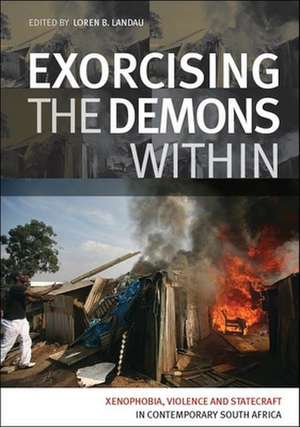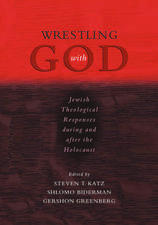Exorcising the Demons Within: Xenophobia, Violence and Statecraft in Contemporary South Africa
Editat de Loren B. Landauen Limba Engleză Paperback – 17 mai 2012
On 11 May 2008, residents of Alexandra Township near Johannesburg turned violently on their neighbours, launching a string of attacks that, two weeks later, left 60 dead, dozens raped and over a hundred thousand displaced. Most of those killed were from beyond South Africa's borders, but at least a third were citizens who, for reasons of ethnicity or political affiliation, failed to protect their space in the country's urban core. Although not the most severe political violence in South Africa's turbulent past, the 2008 attacks reflect an important moment in the country's post-apartheid, post-authoritarian existence: a moment when the government's legitimacy and the post-apartheid order were called into question. This xenophobic violence made evident cracks in the cohesion of law and society while helping to redefine both.
It is these events and subsequent consequences for the ordering of power, population and place that this book explores. Exorcising the Demons Within makes sense of recent anti-outsider violence by situating it within an extended history of South African statecraft that both produced the conditions for the attacks and has been reshaped by it. Drawing on an interdisciplinary team of expert scholars and on new research, this is the first academic text to fully theorise the events that made global headlines in 2008.
Table of Contents
• Introduction: Exorcising the Demons Within: Xenophobia, Violence, and Statecraft in Contemporary South Africa by Loren Landau
• Media Memory: A Critical Reconstruction of the May 2008 Violence by Tamlyn Monson and Rebecca Arian
• People, Space and Politics: An Exploration of Factors Explaining the 2008 Anti-Foreigner Violence in South Africa by Christine Fauvelle-Aymar and Aurelia Wa Kabwe-Segatti
• Disorder in a Changing Society: Authority and the Micro-Politics of Violence by Jean Pierre Misago
• Xenophobia's Local Genesis: Historical Constructions of "Insiders"/"Outsiders" and the Politics of Exclusion in Alexandra Township by Noor Nieftagodien
• Citizenship, Xenophobic Violence and Law's Dark Side by Jonathan Klaaren
• "Separation Anxiety": The Historical Origins of Xenophobia in the SAPS by Darshan Vigneswaran
• Making the Law, Breaking the Law, Taking the Law into Our Own Hands: Sovereignty and Territorial Control in Three South African Settlements by Tamlyn Monson
• From Defending Migrant Rights to New Political Subjectivities: Gauteng Migrants' Organisations After May 2008 by Tara Polzer and Aurelia Wa Kabwe-Segatti
• Postscript: Demons and Democracy: Positive Values and the Politics of Outsiderness in Contemporary South Africa by Loren Landau
It is these events and subsequent consequences for the ordering of power, population and place that this book explores. Exorcising the Demons Within makes sense of recent anti-outsider violence by situating it within an extended history of South African statecraft that both produced the conditions for the attacks and has been reshaped by it. Drawing on an interdisciplinary team of expert scholars and on new research, this is the first academic text to fully theorise the events that made global headlines in 2008.
Table of Contents
• Introduction: Exorcising the Demons Within: Xenophobia, Violence, and Statecraft in Contemporary South Africa by Loren Landau
• Media Memory: A Critical Reconstruction of the May 2008 Violence by Tamlyn Monson and Rebecca Arian
• People, Space and Politics: An Exploration of Factors Explaining the 2008 Anti-Foreigner Violence in South Africa by Christine Fauvelle-Aymar and Aurelia Wa Kabwe-Segatti
• Disorder in a Changing Society: Authority and the Micro-Politics of Violence by Jean Pierre Misago
• Xenophobia's Local Genesis: Historical Constructions of "Insiders"/"Outsiders" and the Politics of Exclusion in Alexandra Township by Noor Nieftagodien
• Citizenship, Xenophobic Violence and Law's Dark Side by Jonathan Klaaren
• "Separation Anxiety": The Historical Origins of Xenophobia in the SAPS by Darshan Vigneswaran
• Making the Law, Breaking the Law, Taking the Law into Our Own Hands: Sovereignty and Territorial Control in Three South African Settlements by Tamlyn Monson
• From Defending Migrant Rights to New Political Subjectivities: Gauteng Migrants' Organisations After May 2008 by Tara Polzer and Aurelia Wa Kabwe-Segatti
• Postscript: Demons and Democracy: Positive Values and the Politics of Outsiderness in Contemporary South Africa by Loren Landau
Preț: 282.02 lei
Nou
Puncte Express: 423
Preț estimativ în valută:
53.97€ • 57.71$ • 44.99£
53.97€ • 57.71$ • 44.99£
Carte tipărită la comandă
Livrare economică 17 aprilie-01 mai
Preluare comenzi: 021 569.72.76
Specificații
ISBN-13: 9789280812152
ISBN-10: 9280812157
Pagini: 296
Dimensiuni: 152 x 229 x 15 mm
Greutate: 0.39 kg
Ediția:New.
Editura: Brookings Institution Press
Colecția United Nations University Press
ISBN-10: 9280812157
Pagini: 296
Dimensiuni: 152 x 229 x 15 mm
Greutate: 0.39 kg
Ediția:New.
Editura: Brookings Institution Press
Colecția United Nations University Press
Notă biografică
Loren B. Landau is director of the African Centre for Migration & Society at the University of the Witwatersrand, Johannesburg.
Descriere
A United Nations University Press with Wits University Press publication
On 11 May 2008, residents of Alexandra Township near Johannesburg turned violently on their neighbours, launching a string of attacks that, two weeks later, left 60 dead, dozens raped and over a hundred thousand displaced. Most of those killed were from beyond South Africa’s borders, but at least a third were citizens who, for reasons of ethnicity or political affiliation, failed to protect their space in the country’s urban core. Although not the most severe political violence in South Africa’s turbulent past, the 2008 attacks reflect an important moment in the country’s post-apartheid, post-authoritarian existence: a moment when the government’s legitimacy and the post-apartheid order were called into question. This xenophobic violence made evident cracks in the cohesion of law and society while helping to redefine both.
It is these events and subsequent consequences for the ordering of power, population and place that this book explores. Exorcising the Demons Within makes sense of recent anti-outsider violence by situating it within an extended history of South African statecraft that both produced the conditions for the attacks and has been reshaped by it. Drawing on an interdisciplinary team of expert scholars and on new research, this is the first academic text to fully theorise the events that made global headlines in 2008.
Table of Contents
• Introduction: Exorcising the Demons Within: Xenophobia, Violence, and Statecraft in Contemporary South Africa by Loren Landau
• Media Memory: A Critical Reconstruction of the May 2008 Violence by Tamlyn Monson and Rebecca Arian
• People, Space and Politics: An Exploration of Factors Explaining the 2008 Anti-Foreigner Violence in South Africa by Christine Fauvelle-Aymar and Aurelia Wa Kabwe-Segatti
• Disorder in a Changing Society: Authority and the Micro-Politics of Violence by Jean Pierre Misago
• Xenophobia’s Local Genesis: Historical Constructions of “Insiders”/“Outsiders” and the Politics of Exclusion in Alexandra Township by Noor Nieftagodien
• Citizenship, Xenophobic Violence and Law’s Dark Side by Jonathan Klaaren
• “Separation Anxiety”: The Historical Origins of Xenophobia in the SAPS by Darshan Vigneswaran
• Making the Law, Breaking the Law, Taking the Law into Our Own Hands: Sovereignty and Territorial Control in Three South African Settlements by Tamlyn Monson
• From Defending Migrant Rights to New Political Subjectivities: Gauteng Migrants’ Organisations After May 2008 by Tara Polzer and Aurelia Wa Kabwe-Segatti
• Postscript: Demons and Democracy: Positive Values and the Politics of Outsiderness in Contemporary South Africa by Loren Landau
On 11 May 2008, residents of Alexandra Township near Johannesburg turned violently on their neighbours, launching a string of attacks that, two weeks later, left 60 dead, dozens raped and over a hundred thousand displaced. Most of those killed were from beyond South Africa’s borders, but at least a third were citizens who, for reasons of ethnicity or political affiliation, failed to protect their space in the country’s urban core. Although not the most severe political violence in South Africa’s turbulent past, the 2008 attacks reflect an important moment in the country’s post-apartheid, post-authoritarian existence: a moment when the government’s legitimacy and the post-apartheid order were called into question. This xenophobic violence made evident cracks in the cohesion of law and society while helping to redefine both.
It is these events and subsequent consequences for the ordering of power, population and place that this book explores. Exorcising the Demons Within makes sense of recent anti-outsider violence by situating it within an extended history of South African statecraft that both produced the conditions for the attacks and has been reshaped by it. Drawing on an interdisciplinary team of expert scholars and on new research, this is the first academic text to fully theorise the events that made global headlines in 2008.
Table of Contents
• Introduction: Exorcising the Demons Within: Xenophobia, Violence, and Statecraft in Contemporary South Africa by Loren Landau
• Media Memory: A Critical Reconstruction of the May 2008 Violence by Tamlyn Monson and Rebecca Arian
• People, Space and Politics: An Exploration of Factors Explaining the 2008 Anti-Foreigner Violence in South Africa by Christine Fauvelle-Aymar and Aurelia Wa Kabwe-Segatti
• Disorder in a Changing Society: Authority and the Micro-Politics of Violence by Jean Pierre Misago
• Xenophobia’s Local Genesis: Historical Constructions of “Insiders”/“Outsiders” and the Politics of Exclusion in Alexandra Township by Noor Nieftagodien
• Citizenship, Xenophobic Violence and Law’s Dark Side by Jonathan Klaaren
• “Separation Anxiety”: The Historical Origins of Xenophobia in the SAPS by Darshan Vigneswaran
• Making the Law, Breaking the Law, Taking the Law into Our Own Hands: Sovereignty and Territorial Control in Three South African Settlements by Tamlyn Monson
• From Defending Migrant Rights to New Political Subjectivities: Gauteng Migrants’ Organisations After May 2008 by Tara Polzer and Aurelia Wa Kabwe-Segatti
• Postscript: Demons and Democracy: Positive Values and the Politics of Outsiderness in Contemporary South Africa by Loren Landau












